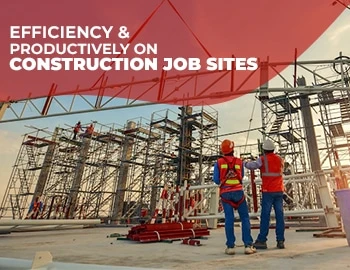Five Things that Kill your Productivity – How to Avoid Them

Five Things that Kill your Productivity - How to Avoid Them
The construction, engineering, and environmental industries are above all about precision and staying organized. Your job is not complete until the project meets the blueprint of your design and there are no loose ends. To get to this point efficiently and effectively, it’s important to stay productive.
Productivity measures how much work you can do in a given period, or how many units of output you produce with a given amount of input. In other words, it measures how much work you can get done on any given day to complete your projects on time. Let’s talk about five things that can kill productivity, and what you can do to avoid them and get back on track.
Distractions
There’s a reason why productivity gurus like Tim Ferriss and Gary Vee talk about minimizing distractions at work—they can completely derail your day, not to mention your project timelines. Never underestimate the potential negative impact of a team member who can’t stay focused on their job. Distractions can include office chit-chat, noisy coworkers, lousy music, social media, and more. If your career requires you to communicate with clients, be sure to put parameters in place to minimize costly distractions. This will help you stay focused but also help the client stay focused on the critical task at hand.
Disorganization
A lack of organization can reduce productivity, and can also lead to safety hazards for construction, engineering, and environmental professionals. To stay organized, make sure that you have “a place for everything”: this means that everything from your computer to your tools has a place where it belongs. Be sure to put everything back in its place when you’re done so that it’s easy to find it the next time you need it. Also, use a calendar, planner, or project management software package to record your tasks, and you’ll never forget to do something again.
Lack of Communication
Good communication is paramount in any workplace. Whether in a project management context or in the field, it’s vital to communicate effectively with your team members to ensure that your clients are happy and your projects are running smoothly. This means that you’ll need to share the correct information promptly, so that there are no surprises. This can also prevent you from repeating tasks unnecessarily, helping you to stay on schedule and within your budget. When communicating with team members, make sure to do so in a way that makes the information easy to access. Giving someone a stack of papers will likely result in the important information being lost, or put down in the wrong place—use a digital tool instead, so you can search for and find the information quickly when it’s needed. Good communication also means listening as well as speaking; be sure to understand what’s being said and react appropriately.
Poor Working Environment
Nothing kills productivity as quickly as a poor working environment. Check your workspace’s temperature, cleanliness, and noise level to ensure you’re comfortable and can remain productive. If you’re in a poorly lit area, you won’t be able to see as clearly. If you’re in an area that’s messy or dirty, it can be distracting, and you might even get sick. If you’re in an area that’s too noisy, you won’t be able to focus on your task and will likely make more mistakes. Be sure to take care of these issues in your work environment so that you can concentrate on completing your work.
Incorrect Tools and Equipment
Using the wrong tools and equipment can reduce your productivity, and can even put your team members at risk. Be sure to know what tools you need to do your job and use them correctly. If you’re in construction, you don’t need to use the same hammer as a roofer—using the wrong tools can increase the time required to complete a job, and possibly lead to mistakes. If you’re in engineering, you need to make sure you’re using the right equipment for your field; this can range from computer software to survey equipment. Again, using the wrong equipment for your job can cause you to take too much time and make more mistakes. The resulting loss of money and time could put your entire project at risk.
Conclusion
Productivity is all about getting the most out of your day. This means you can complete your tasks and get them done on time. There are many things that can kill your productivity, including distractions, disorganization, lack of communication, a poor working environment, and incorrect tools and equipment. Be sure to avoid these five productivity killers so you can finish your work on time.
Michael DeSafey is a leading executive recruiter for professionals in the construction, engineering, and environmental industries. He is currently the President of Webuild Staffing: www.webuildstaffing.com. To learn more about Michael, or to follow his blog, please visit www.michaeldesafey.com.
Efficiency and Productivity on a Construction Job Site

Efficiency and Productivity on a Construction Job Site
Keeping a jobsite running efficiently and cost-effectively is not always an easy task. One common obstacle is the current shortage of skilled labor in the construction industry, along with an increase in the cost of construction materials. It can be challenging for construction contractors and project managers to complete jobs on time and on budget and to keep customers satisfied. To achieve this, it is essential to equip yourself with the best tools to complete construction projects in the most cost-efficient and productive way possible. Here are a few factors to consider to increase efficiency and productivity on construction sites
- Time management
One way to increase efficiency on construction jobsites is effective time management. Scheduling workers to make sure someone is available to work at any given time to get a project completed in a timely manner can be a challenge. And once the workers are there, you will also need supervisors on site who can lead a team and motivate everyone to work productively.
- Vetting Subcontractors
Construction professionals must be very cautious when hiring subcontractors. Project managers can be held legally liable for any faulty workmanship on a job. All subcontractors hired for a project should be thoroughly vetted, including verifying all references, inspecting documentation such as licenses, employee records, or insurance coverage. Always review the subcontractor’s business model and financial solvency.
- Maintaining Insurance Requirements
Without the proper insurance, construction contractors and project managers are legally responsible if things go wrong on a jobsite. Workers can be injured, jobs can be completed that are not up to quality standards, environmental contamination can occur while completing a project, among other possibilities. All these issues can cause liability issues for contractors. A periodic review of insurance coverage is necessary to ensure projects run efficiently and smoothly and that all parties involved are properly protected.
- Keep Lines of Communication Open
Effective communication is important in letting employees know the expectations of their manager regarding the time scope of completing a project, the materials needed, and in coordinating the efforts of all team members. Without keeping the lines of communication open, a project can quickly get out of control. Everyone must know and understand the tasks needed to complete a job on time and with quality workmanship. Without effective communication, there can be delays that prove costly in time and money.
- Employee motivation
Construction employees expect to be valued and treated fairly, which includes providing a safe working environment, listening to any employee concerns that may arise, and working to find a solution to the problem. When employees feel valued, they will be motivated to perform to the best of their ability. The more productive the employees are, the faster the job can be completed, which will help get the project completed on time and on budget.
Construction contractors have a lot to think about in day-to-day operations, including trying to save on costs. Understanding industry-specific risks and learning how to mitigate them are key to achieve efficiency and productivity on construction jobsites.
Michael DeSafey is a leading executive recruiter for professionals in the construction, engineering and environmental industries. He is currently the President of Webuild Staffing www.webuildstaffing.com . To learn more about Michael or to follow his blog please visit www.michaeldesafey.com
